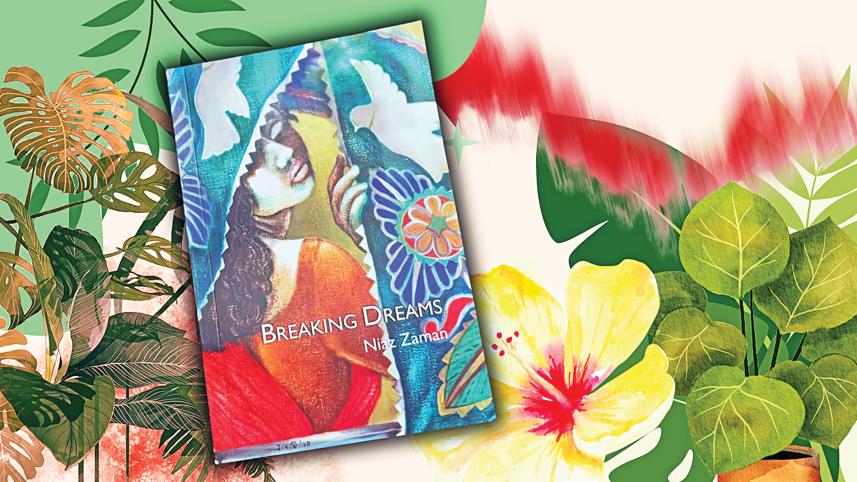FICTION BOOK REVIEW: Fragments of memory and regret

The proof that Dr Niaz Zaman is an amazing writer lies in the fact that she knows exactly how to wound you with four words: "You are too late." As a retired professor of English from the University of Dhaka and recipient of the Ekushey Padak—one of Bangladesh's highest literary honours—she's spent her career translating the untranslatable: the ache of women who lived and loved in wartime, who survived Partition, who buried their dreams beneath duty. Her 2025 collection Breaking Dreams isn't just another book of stories. It's 12 confessions from women across generations, eight of them previously published, now gathered like letters found in an attic—each one a small devastation, each one impossibly true.
Each story cracked open something in me. I found myself identifying with women who were much older, who had witnessed different wars, different losses, different kinds of silence—and yet, their questions were mine too.
With every ending, I exhaled a sigh I didn't know I'd been holding. "What if?" became a motif in my head filled with threads of thoughts. Sometimes they whispered, sometimes they screamed. After finishing each story, I caught myself reaching for my phone, texting or calling someone, asking: "Will you remember me how I am now, even after 20 years?"
It wasn't about the characters anymore. It was about me. And them. And all the selves we lose and carry and bury along the way.
One story from the collection, "The Letter", explores the futility of confession when it arrives too late. It's everything she couldn't say when it mattered. This isn't a story of love fulfilled—it's about missed cues, dignity mistaken for indifference, and affection buried under social roles. The ending was a quiet catastrophe for me. "You are too late." I almost closed the book here, not because I was done, but because that single sentence had already gutted me. It's not angry or cruel—it's just true. A life unlived, love never named, loss unacknowledged until it was no longer changeable.
"Breaking Dreams" takes memory and reshapes it into fiction with surgical grace. Where "The Letter" is about love unspoken, this story is about love remembered in fragments—through war, separation, marriage, migration, and dreams. It's an elegy not just to a man, but to a version of the narrator that might have been. The story begins in a surreal frame—a dream set in Lahore. But it's quickly ruptured: "And the dream breaks." This line isn't just a transition; it's a mission statement. Everything after becomes a series of broken dreams: literal, metaphorical, historical.
"My Friend, My Enemy" reads like a diary-turned-letter, covering over 20 years, two wars, multiple cities, and a love that mutates from possibility to ghosthood. The brilliance lies in how Zaman tells national trauma through personal memory. She's crafted a story not just about two people, but about two countries that were once one—stitched by love, split by history.
"Recommendation Letter for Iqra Islam" was personally interesting to me. Even though I never got one, I had several chances to ask Dr Niaz Zaman for a recommendation letter for myself. But I never found the courage, thinking maybe I was not quite qualified yet to ask her for something like this. Then I read this story and I remembered a book reading session I once joined, where the author herself said the number of recommendation letters she writes regularly made it almost inevitable that she would one day write this story for Iqra Islam. I felt how the name Iqra itself was so symbolic. In Arabic, Iqra means "read." What an amazing choice of word!
"The Collaborator's Daughter" forces you to sit with discomfort—to understand that collaboration isn't always monstrous but often born of fear, and that its price is paid by the children, by daughters like Ratna. The prose is clean, but its directness makes the emotion sting harder. Moments of tenderness slip through like light through cracks, making the tragedy more acute.
"My Grandmother's Secret" is a multi-generational spiral that takes its time before turning the mirror inward. The delayed revelation isn't a plot twist—it's a recontextualisation of every detail that came before. You find yourself re-reading lines, and everything hits differently after the final page. But "My Grandmother's Crazy Poet" starts hitting from the beginning. It opens with the scent of loss but pulls us into the lifeblood of memory. The brilliance lies in the double vision of two women, two voices-one voice remembering, another finally confessing. The chain at the story's end is more than jewelry; it's a metaphor for life interrupted, repaired, and passed down.
These stories share a remarkable craft. The endings are emotional rather than plot driven, and that's what makes them unforgettable.
Breaking Dreams isn't just a gathering of stories; it's a mirror of time. Its characters examine our conscience. In just a few words, there is a festival of fireflies here. Sometimes it is the light of memories, sometimes the darkness of forgetfulness. At times they also act as moral examiners or a timeless witness to human existence.
Lamia Sultana Kakon is a writer, poet, translator and journalist. Reach her at kakonsultana1908@gmail.com.
 For all latest news, follow The Daily Star's Google News channel.
For all latest news, follow The Daily Star's Google News channel.
Comments